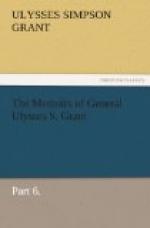While these preparations were going on the enemy was not entirely idle. In the West Forrest made a raid in West Tennessee up to the northern border, capturing the garrison of four or five hundred men at Union City, and followed it up by an attack on Paducah, Kentucky, on the banks of the Ohio. While he was able to enter the city he failed to capture the forts or any part of the garrison. On the first intelligence of Forrest’s raid I telegraphed Sherman to send all his cavalry against him, and not to let him get out of the trap he had put himself into. Sherman had anticipated me by sending troops against him before he got my order.
Forrest, however, fell back rapidly, and attacked the troops at Fort Pillow, a station for the protection of the navigation of the Mississippi River. The garrison to force a passage southward, if they are successful in reaching the Virginia and Tennessee Railroad, to cut the main lines of the road connecting Richmond with all the South and South-west.
Gillmore will join Butler with about 10,000 men from South Carolina. Butler can reduce his garrison so as to take 23,000 men into the field directly to his front. The force will be commanded by Maj.-General W. F. Smith. With Smith and Gillmore, Butler will seize City Point, and operate against Richmond from the south side of the river. His movement will be simultaneous with yours.
Lee’s army will be your objective point. Wherever Lee goes, there you will go also. The only point upon which I am now in doubt is, whether it will be better to cross the Rapidan above or below him. Each plan presents great advantages over the other with corresponding objections. By crossing above, Lee is cut off from all chance of ignoring Richmond and going north on a raid. But if we take this route, all we do must be done whilst the rations we start with hold out. We separate from Butler so that he cannot be directed how to co-operate. By the other route Brandy Station can be used as a base of supplies until another is secured on the York or James rivers.
These advantages and objections I will talk over with you more fully than I can write them.
Burnside with a force of probably 25,000 men will reinforce you. Immediately upon his arrival, which will be shortly after the 20th inst., I will give him the defence of the road from Bull Run as far south as we wish to hold it. This will enable you to collect all your strength about Brandy Station and to the front.
There will be naval co-operation on the James River, and transports and ferries will be provided so that should Lee fall back into his intrenchments at Richmond, Butler’s force and yours will be a unit, or at least can be made to act as such. What I would direct then, is that you commence at once reducing baggage to the very lowest possible standard. Two wagons to a regiment of five hundred men is the greatest number that should be allowed, for all baggage, exclusive of subsistence stores and ordnance stores. One wagon to brigade and one to division headquarters is sufficient and about two to corps headquarters.




